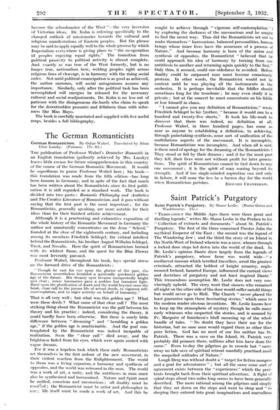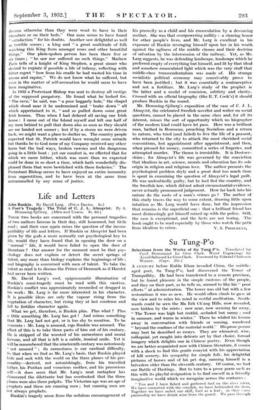Saint Patrick's Purgatory
THROUGHOUT the Middle Ages there were three great and thrilling legends," writes Mr. Shane Leslie in the Preface to his Collection of extracts and documents " about St. Patrick's Purgatory. The first of the three concerned Prester John the mythical Emperor of the East ; the second was the legend of The Wandering Jew ; and the third the story of an Island in the North-West of Ireland wherein was a cave, whence through a locked door steps led down into the world of the dead. In Mr. Leslie's opinion Dante drew largely from the legends of Patrick's purgatory, whose fame was world wide—" a mediaeval rumour which terrified travellers, awed the greatest criminals, attracted the boldest of knight errantry, engla- moured Ireland, haunted Europe, influenced the current views and doctrines of purgatory and not least inspired Dante." This tremendous assumption Mr. Leslie does not very con- vincingly uphold. The story went that sinners who remained all night on the other side of the door would suffer untold things but would never go to Hell. The Church " never placed the least guarantee upon these fascinating stories," which seem to the modern reader obvious inventions. Mr. Leslie knows how to keep up the atmosphere of mystery though he calls many early witnesses who suspected the stories, and is amused by Fr. Macguire of Innisheen's bluff summing up of the whole bundle of tales. " No doubt they have their use for the historian, but no sane man would regard them as other than pure fiction. God has no need of our lies neither has St. Patrick. There was a cave on the Island, St. Patrick very probably did penance there, millions after him have done the same." Even to-day the pilgrims go in crowds but " carry away no tale save of spiritual retreat manfully practised amid the unspoiled solitudes of Nature."
Lough Derg was without doubt a " target for fiction mongers and a goal for adventurers " ; but all the same some sort of agreement exists between the "experiences" which the peni- tents brought back from their spiritual adventure. A flight of spiral steps about two miles long seems to have been generally described. The more rational among the pilgrims said simply that they sat down on the steps and went to sleep and " in sleeping they entered into great imaginations and marvellous dreams otherwise than they were wont to have in their chambers or on their beds." One man seems to have found satisfaction " for his doubts. Another saw delightful as well as terrible scenes ; a king and " a great multitude of folk watching this King from amongst roses and other beautiful things." One plain-spoken person has been there five or six times ; " he saw nor suffered no such things." Mathew Paris tells of a knight of King Stephen, a great sinner who desired to expiate if possible a life of infamy, reflecting with bitter regret " how from his cradle he had wasted his time in arsons and rapine,." We do -not know what he suffered, but even in the matter of self-accusation he would seem to• have been imaginative.
In 1632 a Protestant Bishop was sent to destroy all vestige of the supposed purgatory. He found what he looked for.
The cave," he said, was a poor beggarly hole," the chapel which stood near it he undermined and brake down_" all which appertained to it, and so pulled down some great Irish houses. Thus when I had defaced all saving one Irish house : I came out of the Island myself and left one half of my men behind to pull that down also so soon as they should see me landed not sooner ; lest if by a storm we were driven back, we might want a place to shelter us. The country people expected that St. Patrick would have wrought some miracle but thanks be to God none of my Company received any other harm but the bad ways, broken cawsies and the dangerous going in a little boat : yet our comfort is, we effected that for which we came hither, which was more than we expected could be done in so short a time, which hath wonderfully dis- pleased them that were bewitched with these fooleries." The Protestant Bishop seems to have enjoyed an entire immunity from superstition, and to have been at the same time untrammelled by any sense of justice.































 Previous page
Previous page